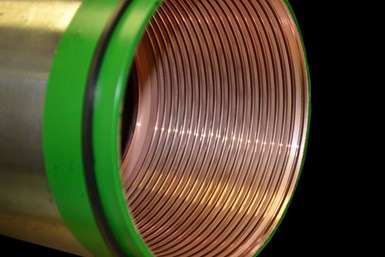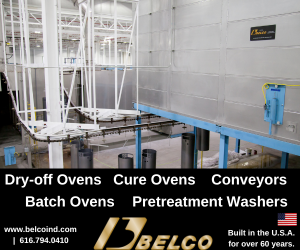Selective Plating Certification for Oil and Gas
Certification ensures consistent quality of selective brush plating for premium threaded connections.

Copper selective plating used on threaded coupling.
Photo Credit: SIFCO ASC
Q: What certifications are needed for selective plating for the oil and gas industry?
A: With extreme oil and gas supply shortages looming ever closer and the Strategic Petroleum Reserve of the United States reaching its lowest level in 38 years, the equipment used in the oil and gas industry must run as smoothly as possible.
When the two stainless steel parts of a threaded coupling are in direct contact with one another, the constant friction can result in the galling of the metal, wherein the threads seize or abrade — causing the joint elements to jam or damage the threads themselves.
For parts such as Oil Country Tubular Goods (OCTGs), this threatens leaks and oil blowouts and can often halt the production processes for which the parts are responsible. And so, the economic effects can be more than simply getting the parts replaced or repaired, which is increasingly undesirable at a time when oil and gas supplies are low.
Newly manufactured stainless-steel couplings at risk of galling and seizing need a thin layer of copper coated onto their threads. These threaded connections, often called premium threaded connections, are an attempt to improve the American Petroleum Institute’s standards for threaded pipes and couplings used in OCTGs.
These oil and gas pipes can be very large in size and the threads that need to be plated are at the ends of the pipe. Therefore, standard tank plating is impractical and, in most cases, impossible. Due to their fragile nature or risk of compromise, there is no margin for error for parts used in this industry and it is required that they undergo a selective plating approach.
Selective plating is a portable electroplating method used to enhance, repair, and refurbish localized areas on manufactured components, allowing for the electrolytic coating of localized surfaces without electroplating tanks. As an industry leader in selective plating, companies across the globe have relied on SIFCO ASC to coat their threaded connections for many years.
Consistency in the copper plating of premium threaded connections.
The two leading oil field thread design licensors, VAM and Tenaris, have recently instituted programs to establish a standard procedure for qualification, evaluation, and acceptance of copper selective plating. This procedure requires operators to receive formal and specialized training and certification from an “approved selective brush plating vendor” to apply selective copper plating to the premium threaded connections provided by VAM and Tenaris.
In response to these new specifications, SIFCO ASC, a global leader in selective electroplating and anodizing services, has developed its selective plating certification: Copper Select. Having received approved vendor status by both licensors, SIFCO ASC is sanctioned to train and qualify operators from around the globe in selective plating methods in line with the VAM and Tenaris specifications.
SIFCO ASC has been offering training courses since its inception. Indeed, Copper Select was added and qualified in 2013 to the portfolio of training courses, which includes the Basic Training Course and the Cadmium/Zinc Nickel Certification Training Course, amongst others. These training courses are available worldwide by SIFCO ASC either at their facilities in Cleveland, Ohio, and/or on-site at the customer's location of choice.
Passing SIFCO ASC's Copper Select Certification requires the completion of a week-long training course and submitting qualification samples for approval. Upon completing the process, the licensee will be permitted to selectively plate copper onto Premium Threaded Connections via the technique taught in SIFCO ASC's Copper Select training course. However, to maintain the integrity of the Copper Select process, qualified licensees will be audited annually by SIFCO ASC.
Acquiring approved selective plating certifications
Parties interested in acquiring the Copper Select Certification must enter into a three-year licensing agreement with SIFCO ASC, purchase a basic set of equipment tailored explicitly to plating threaded connections, and consistently monitor and measure the results to make sure that the standards expected within the certification are met. To keep the highest quality standards, operators must recertify before the end of the three-year period. Additionally, the accreditation is location-based, meaning that organizations with multiple locations must acquire the Copper Select Certification for each site.
Suppose an operator has not attained the Copper Select Certification or any other VAM- and Tenaris-approved training. In that case, they will not be permitted to work on the premium threaded connections provided by either licensor, which can, in turn, cause production to grind to a halt. Completing the Copper Select Certification ensures the highest standards of selective copper plating for parts used in the oil and gas industry. At a time when there is increased pressure for this industry to succeed, production problems mustn’t be a result of improper processes in part manufacture.
SIFCO ASC’s Copper Select Certification guarantees that selective plating is achieved in line with the SIFCO Process, which will provide the highest standards as the industry leader in selective electroplating. This means that oil and gas onshore and offshore procurement can go forward without any doubts.
About the Author

Scott Peterson
Scott Peterson is Senior Technical Training Manager at SIFCO ASC. Visit sifcoasc.com.
Related Content
Advantages to Pumped Eductor Agitation
Not all agitation methods are created equally. Pumped agitation with eductor nozzles can improve process tanks and quickly show a reduction in operating costs while keeping staff safe, following environmental legislation and preventing pollution.
Read MoreHow to Choose Between Sulfate and Chloride-Based Trivalent Chromium
There are several factors to consider when choosing between sulfate and chloride-based baths for trivalent chromium plating. Mark Schario of Columbia Chemical discusses the differences and what platers should keep in mind when evaluating options.
Read MoreTrivalent Chrome Overview
As the finishing industry begins to move away from the use of hexavalent chromium to trivalent chromium, what factors should finishers consider as they make new investments? Mark Schario, chief technology officer for Columbia Chemical offers a helpful overview of this complicated topic.
Read MoreTroubleshooting Alkaline Zinc
One of the most common problems that can arise when plating with alkaline zinc is an imbalance of brightener in the solution. In this helpful Ask the Expert article, Chad Murphy of Columbia Chemical discusses how different zinc metal concentrations and brightener concentrations can impact efficiency.
Read MoreRead Next
Selective Finishes
A look at finishing complex parts through selective plating and selective powder coating.
Read MoreContinuing Innovation in Selective Plating
Chic Allen, general manager of SIFCO Applied Surface Concepts, discusses the benefits and considerations for the automation of selective brush plating.
Read MoreCorrosion Protection Via Selective Plating
Carbon and high strength steels are some of the most widely used metals today, and the corrosion of this type of material is a serious problem for a variety of industries. However, corrosion can largely be controlled with developments in various protective solutions. Sarah Medeiros, Corrosion Engineer at SIFCO ASC, discusses developments in R&D to help slow down the corrosion process.
Read More





















